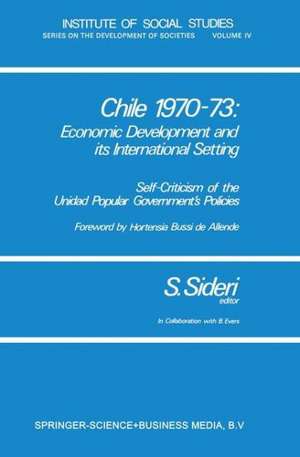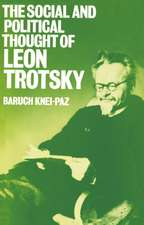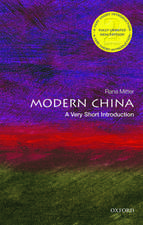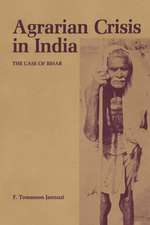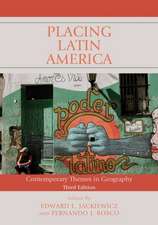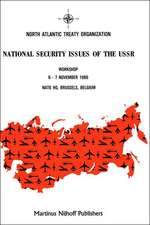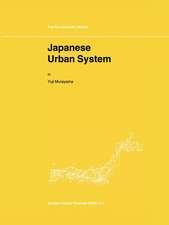Chile 1970–73: Economic Development and its International Setting: Self-criticism of the Unidad Popular Government’s Policies: Institute of Social Studies Series on Development of Societies, cartea 4
Autor Sandro Antonio Rosario Sideri Editat de B. Eversen Limba Engleză Paperback – 1979
Preț: 396.02 lei
Nou
Puncte Express: 594
Preț estimativ în valută:
75.78€ • 82.57$ • 63.85£
75.78€ • 82.57$ • 63.85£
Carte tipărită la comandă
Livrare economică 23 aprilie-07 mai
Preluare comenzi: 021 569.72.76
Specificații
ISBN-13: 9789401182331
ISBN-10: 9401182337
Pagini: 432
Ilustrații: XXVII, 401 p. 3 illus.
Dimensiuni: 155 x 235 x 23 mm
Greutate: 0.6 kg
Ediția:Softcover reprint of the original 1st ed. 1979
Editura: SPRINGER NETHERLANDS
Colecția Springer
Seria Institute of Social Studies Series on Development of Societies
Locul publicării:Dordrecht, Netherlands
ISBN-10: 9401182337
Pagini: 432
Ilustrații: XXVII, 401 p. 3 illus.
Dimensiuni: 155 x 235 x 23 mm
Greutate: 0.6 kg
Ediția:Softcover reprint of the original 1st ed. 1979
Editura: SPRINGER NETHERLANDS
Colecția Springer
Seria Institute of Social Studies Series on Development of Societies
Locul publicării:Dordrecht, Netherlands
Public țintă
ResearchCuprins
1. The Reasons for Self-Criticism of the Unidad Popular Government.- 2. General Considerations on the Chilean Economic Structure.- 1. Antecedents in the Structure of Chile’s Economy.- 2. The Economic and Political Antecedents of the Economic Situation.- 3. Some General Considerations.- Notes.- Tables.- Statistical Appendix.- 3. Structural Transformations in Chile’s Economy and in its System of External Economic Relations.- 1. From the Structural Crisis to the Transformation Crisis.- 2. The Legacy of the Capitalist Economic Structure.- 3. The Nature and Extent of the Structural Changes.- 4. The Internal Economic Effects of the Changes.- 5. The Reaction of Other Countries to the Chilean Structural Changes.- 6. The External Stranglehold.- 7. The External Financing Policy and the Deficit.- 8. Conclusions.- Notes.- Tables.- 4. The Foreign Policy of the Unidad Popular Government.- 1.–12..- Notes.- 5. The External Sector and the Policies of the Unidad Popular Government.- 1. The Chilean Economy during the 1960s.- 2. Foreign Trade Policy.- 3. Some Considerations on the Economic Blockade during the 1970–73 Period.- Notes.- Tables.- 6. Nationalization of Copper in Chile and its International Repercussions.- 1. Chile and the U.S. Copper Companies, 1920–70.- 2. Nationalization of Copper in 1971.- 3. The Development of the International Conflict on Chilean Copper: the Causes and Consequences.- 4. Conclusions.- Notes.- Tables.- 7. The Industrial Sector: Areas of Social and Mixed Property in Chile.- 1. National and Foreign-Owned Monopolies in the Urban-Industrial System.- 2. The APSM in Industry.- 3. The Formation of the APSM in Industry.- 4. The APSM and Domestic Financial Problems.- 5. The Internal Organization of the APSM in Industry.- 6. Industrial Production in the APSMand External Difficulties.- Notes.- Tables.- 8. Nationalization of the Banking System in Chile.- 1. Characteristics of the Banking and Financial System in 1970.- 2. The UP Government’s Policy of Nationalizing Banks.- 3. How the Nationalized System Worked.- 4. The Features of Nationalized Banking in Chile.- 5. Conclusions.- Notes.- 9. Inflation in Chile and the Political Economy of the Unidad Popular Government.- 1. Inflation and Economic Disequilibria.- 2. Determinants of the Economic Evolution during 1971–73.- 3. A Description of the Inflationary Process during 1971–73.- 4. The Dynamics of Economic Disequilibria.- 5. Conclusions.- Notes.- Tables.- 10. The Process of Transformation and the Role of International Cooperation: an Observer’s View.- 1. The UP’s Economic Programme.- 2. The Transformation Process and the Role of Foreign Assistance.- 3. Chile’s Development and Foreign Assistance.- 4. International Cooperation for Development.- Notes.- Table.
